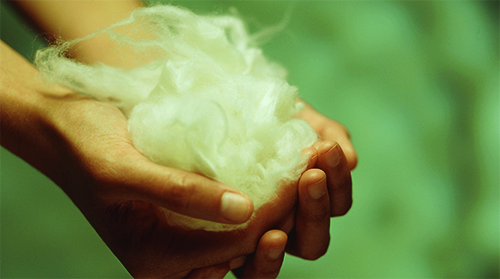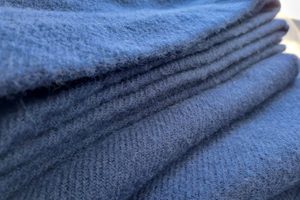New Zealand yarn engineers and the creators of Perino yarns, Woolyarns Limited, are minimising the negative environmental impacts in the textile industry through the sustainable spinning of luxury yarns. The team at Woolyarns mindfully sources natural raw materials, closely monitors all inputs to ensure the spinning process is completed in an environmentally conscious way, and produces luxurious yarns that are high quality and long-lasting – reducing overall environmental impacts.
One of the biggest contributors to the fashion and textile industries’ sustainability issues is the pollution generated throughout the production process of textile products, and the rate at which textiles are disposed of and put into landfills. The use of harmful dyestuff, chemicals, and the high consumption of power, water, and gas are harmful to the environment and the people and animals who inhabit them. These impacts are made worse by the mass production of lower-quality textiles around the world in the fast fashion industry in which the styles and fabrics need replacing every couple of weeks/months.
Steps are being made towards more sustainable practices in the industry, and countries are committing to reducing the environmental and social issues around the world through agreements such as the United Nations 17 Sustainable Development Goals (UN SDGs). There has been a consumer shift towards purchasing sustainably-made textiles that are longer-wearing and timeless. A research assessment discussed later in this article explains why this shift is incredibly important to the overall environmental impact of a product.
The New Zealand Resource Management Act 1991 (RMA) was put in place to ensure the safety of people, animals, and the environment through the sustainable management of resources, both natural and physical in New Zealand. The RMA dictates a lot of baseline level practices for New Zealand businesses and manages the sustainable use of water, power, gas, and raw materials used in the production of yarns. The RMA goes a long way in ensuring New Zealand meets some of the targets laid out in the UN SDGs, as discussed in an earlier Woolyarns post.
Woolyarns go beyond the requirements of the RMA to produce environmentally conscious yarns that go into durable fabrics that can be reused, recycled, and are biodegradable.
Woolyarns actions –
It all starts with the raw materials. Woolyarns use natural fibres that are traceable (where possible), certified (where possible), and sourced from suppliers that have long-standing relationships with Woolyarns. Raw fibres used in Woolyarns yarn collection are natural, renewable, biodegradable, and create high-quality products that can be reused and recycled and will break down at the end of their life.
The supply chain of Perino yarns is centered around onshore suppliers and businesses. Onshoring provides Woolyarns with better supply chain control, quality management, and reductions in cost and environmental impacts from transportation. Brushtail possum down, a fibre featured throughout the Perino yarns range, is exclusively supplied from New Zealand trappers through a local fibre collection agency. The fibres are scoured and dehaired by Woolyarns before being dyed and spun into luxurious yarns in the Woolyarns factory. Many Perino customers are also New Zealand brands who use local knitting and weaving companies that Woolyarns work closely with to ensure high quality, New Zealand-made products that are fit for domestic and international markets.
Environmentally conscious production –
Woolyarns actively monitor the amount of water, electricity, and gas consumed monthly to see where reductions can be made. This constant monitoring ensures resources are being used as efficiently as possible. Constant investment of time and money into the Woolyarns factory, machinery, and production processes ensures production efficiency, and maximisation of the resources used.
Woolyarns use reactive dyes in the dyeing of fibres and yarns. Reactive dyes are more environmentally friendly than popular direct dyes because they require a lower water temperature, and the dyestuff is fully absorbed by the fibre – leaving the wastewater clear and reusable. Reactive dyes also provide better colour fastness, adding to the longevity of Woolyarns yarns and the products made from the yarns. A water-soluble and biodegradable detergent is used for the scouring of animal fibres and is a friendlier way of scouring compared to other harsh chemicals that are often used. The trade wastewater from the onsite dyehouse facility is regularly tested and certified by the local council – continuously meeting the low-risk mark.
Woolyarns products meet the requirement for the European ReaCh standard that protects humans and the environment from the use of harmful chemicals. No formaldehyde or heavy metals are used in the dyeing or spinning process.
Reducing carbon footprint – utilising possum and making quality products
New Zealand’s net greenhouse gas emissions for 2018 were reported at 55.5 MtCO2e. Per capita, this is roughly 31% less than the average for the other United Nations Annex 1 counties – United Kingdom, Australia, Japan, USA, and Germany. (Ministry for the Environment) The protection of Native bush in New Zealand can have a significant impact on the carbon emissions of New Zealand.
Introduced herbivores such as Brushtail possums have huge negative effects on New Zealand’s carbon footprint and carbon stocks. Carbon stocks are the measure of carbon sequestered from the atmosphere and stored in the trees, soil, forest litter, and even dead wood – this is higher in native bush. Sustained pest control could see potential additional carbon sequestration of 8.4 MtCO2e – which is the equivalent to almost 60% of the total emissions from the New Zealand transport sector in 2021 (Forest and Bird Report 2021). Trapping of pests such as the Brushtail possum in New Zealand is regulated by the Animal Welfare Act 1999, the New Zealand Fur Councils code of practice which adheres to International Humane Trapping Standards, ensuring the practice is both ethical and humane.
Brushtail possum down is used in Woolyarns Perino range and is a byproduct of the continuous conservation efforts by private trappers and the New Zealand government’s Department of Conservation. The fibres provide amazing warmth, softness, and pilling resistance to fabrics thanks to the fibres unique structure, creating long-wearing products that can last 10-20 years.
Lifecycle assessment research on wool garments from cradle to grave found that the consumer use phase is the most influential in the overall footprint of a garment. Garments that are long-lasting and can be worn repetitively are far better for the environment because the extended use time makes the initial energy, water, and carbon emitted in the production more worthwhile. Quality garments need to be replaced less often, reducing the resources used and the overall impact.
Recycling to reduce waste –
Woolyarns recycling programs prevent an enormous amount of fibre, yarn, and even fabric from going to waste. Several recycling programs are underway at Woolyarns.
Production waste program: waste fibres and yarns collected during the yarn production process are collected and stored in a categorized system. They are then dyed and spun into recycled yarn blends that can be used for hardwearing products such as workwear and jacket linings. It is impossible to have zero waste in the production process and this initiative ensures any fibres and yarns left behind are able to be used in other ways and do not go to waste.
Redundant yarns store: Woolyarns run a website dedicated to selling redundant stock, cancelled orders, and seconds yarns at a reduced price. This gives smaller businesses that cannot meet the usual production minimums the chance to purchase yarns in smaller quantities and prevents any redundant or usable seconds stock from going to landfill.
New Zealand Police Jersey initiative: Woolyarns teamed up with the New Zealand Police to recycle old police uniform jerseys into a new and usable product. Fabric from the old jerseys was raggied at Woolyarns into fibre form and spun into yarn suitable for blankets to be used in police cars. The initiative is a step toward preventing the estimated 17 tons of police uniforms sent to landfills last year. The projects trial run has been a success and has seen 145 jumpers turned into 80 usable blankets. Woolyarns are excited about how this project will grow from here.
Woolyarns environmentally conscious spinning processes, and the use of Brushtail possum down fibre from New Zealand conservation efforts combine to create yarns that are natural, biodegradable, durable, high performing and that contribute to the protection of forests and the sequestration of carbon. Garments made from Perino yarns are low pilling, so they look new for longer – increasing the desire to re-wear them often. They are also warm, and lightweight, with less clothing layers needed to be warm and comfortable. This is important for the lifecycle of a fabric, as an increased use phase is the most influential in the reduction of a garment’s environmental impacts.
The conservation of the Brushtail possum is important for the longevity of New Zealand’s flora and fauna and impacts the amount of carbon that is naturally stored. Woolyarns are proud to be spinning Brushtail possum down into sustainable luxury yarns.

